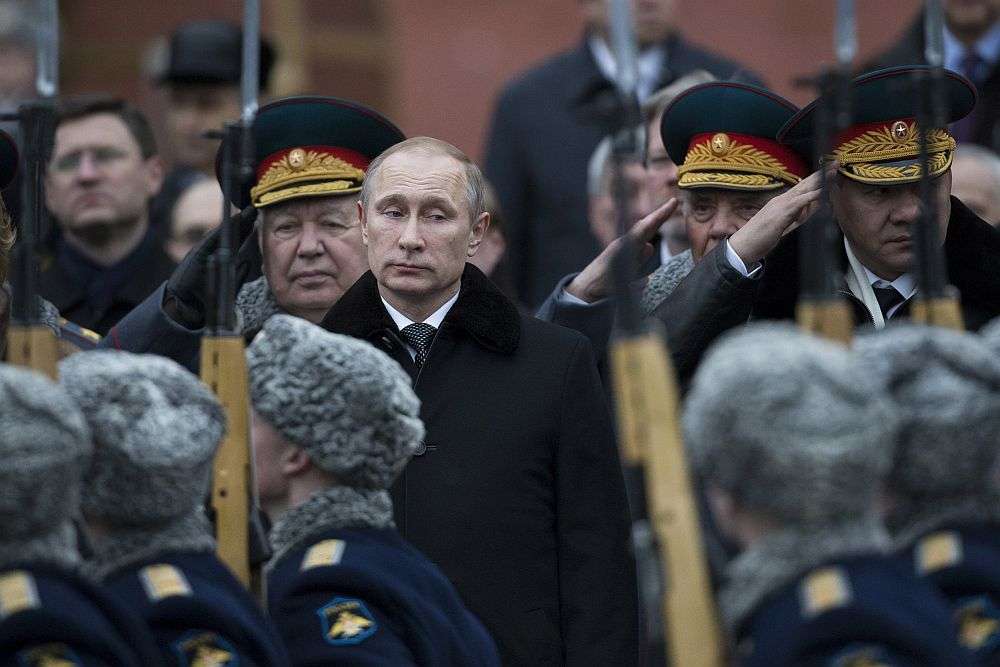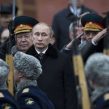
Russia Rejects Ukrainian President’s Peace Proposals
Publication: Eurasia Daily Monitor Volume: 11 Issue: 117
By:

On June 24, Russian President Vladimir Putin again denied the existence of a Ukrainian nation in its own right, distinct from Russia; and he went on to dismiss Ukrainian President Petro Poroshenko’s June 20 ceasefire and peace offers as inadequate. The first part of Putin’s statement suggests that he cannot make peace with a sovereign Ukraine. His statement’s second part flows from the first.
Putin spoke in front of an international audience in Vienna, yet no Western reaction appears to have ensued. Poroshenko had announced his ceasefire and peace proposals on June 20 (see EDM, June 24, 26). He took this initiative as the leader of an aggressed country; but Russia demands more concessions from Ukraine.
In Putin’s words, “We shall always protect the ethnic Russians in Ukraine, as well as that part of Ukraine’s population that feels inseparably linked with Russia ethnically, culturally and linguistically, that feels to be a part of the broader Russian World [Russkyi Mir]” (Interfax, RIA Novosti, March 25; and see below). Putin’s Russian World and Novorossiya concepts, which he enunciated on March 18 and April 17, respectively, based on ethnicity, language, and history, claim that Russia is entitled to override Ukraine’s sovereignty and even intervene in the country (see EDM, March 25, May 14).
Russia’s key goals at this stage are to: 1) avoid being held responsible for its war by proxy against Ukraine, portraying the conflict instead as purely internal to Ukraine; 2) prolong the ceasefire indefinitely, shielding its proxies and preventing Ukraine from regaining control of its Donetsk and Luhansk regions; 3) enable those two “people’s republics” to retain their weaponry and consolidate their organization, becoming irremovable; 4) obtain de facto recognition of those two secessionist leaderships by pressing Ukraine’s government to negotiate with them under international mediation; and 5) assert a droit de regard for Russia over Ukraine’s state structure and constitution.
In line with those goals, Moscow has rejected the terms of Poroshenko’s June 20 ceasefire and peace offers.
On June 21 and again June 22, Putin criticized those offers as merely a seven-day “ultimatum” to the pro-Russia paramilitary forces (Putin named those forces “opolchenie,” a term potentially connoting popular legitimacy). He called for the ceasefire to be prolonged, and accompanied by negotiations among all parties to the conflict, specifically “the Kyiv authorities and the protesting regions,” toward revising Ukraine’s constitution. In a June 23 telephone call with United States President Barack Obama, Putin again urged extending the ceasefire and a start to political negotiations “between the opposing sides,” i.e., Kyiv and those two “people’s republics.” Without that, Poroshenko’s or any proposals “will not be realistic or viable,” as far as Russia is concerned (kremlin.ru, June 21, 22; Interfax, June 23).
Putin’s June 24 statements in Vienna (see above) asserted even more explicitly his conditions to a “peace process,” to wit: the ceasefire is “positive” but not enough, Kyiv should continue it indefinitely; Poroshenko “must start substantive negotiations […] toward an agreement with eastern Ukraine [sic]”; and that should involve certain constitutional guarantees. Without such a political solution, Putin claimed, Kyiv’s demand for its armed opponents to disarm is “not the road to peace,” and even “nonsensical.” This suggests that Russia is prepared to sustain its paramilitary proxies in Ukraine as long as necessary, even if Ukraine fulfills Moscow’s parallel demand to disarm the Ukrainian Right Sector now (Interfax, RIA Novosti, March 25).
Russia’s Foreign Affairs Minister Sergei Lavrov echoed Putin’s conditions on June 21 and again on June 21. Lavrov, however, introduced a specific demand for Kyiv to enter into talks with “Donetsk and Luhansk,” implying the leaders of those “people’s republics’” leaders. This would start as a “dialogue” under international mediation, after which “we [sic] will need to start direct negotiations” between Kyiv and those regions to define their constitutional status. “The main thing is to ensure the beginning of a negotiation process,” Lavrov emphasized, reflecting Russia’s priority to legitimize its proxies through this process (Interfax, June 22, 24).
In a telephone call with US Secretary of State John Kerry, Lavrov wanted the ceasefire to be prolonged and Kyiv to start talks with “those who really control the situation there”: specifically, he called for a “dialogue on a co-equal basis [ravnopravno] with the representatives of Donetsk and Luhansk” (Interfax, June 22). Undoubtedly, Lavrov asked Washington to endorse these demands in Kyiv.
At that juncture, Moscow had already received Berlin’s support for these demands. Other Western governments are merely drifting along with this scenario. Indeed a preliminary round of talks was held on June 23 in Donetsk, welcomed by Putin (see accompanying article).




